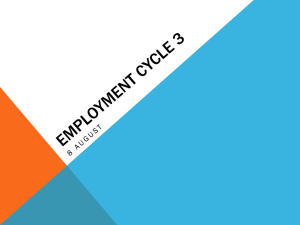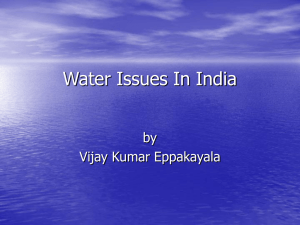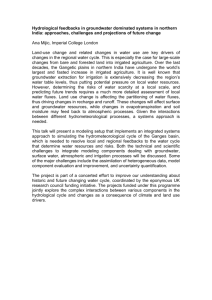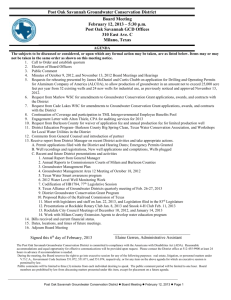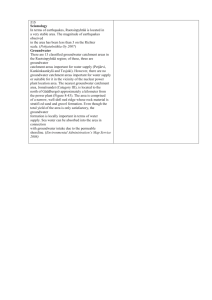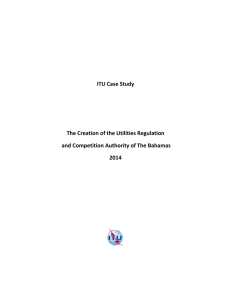Environmental Regulation of Groundwater Protection and
advertisement
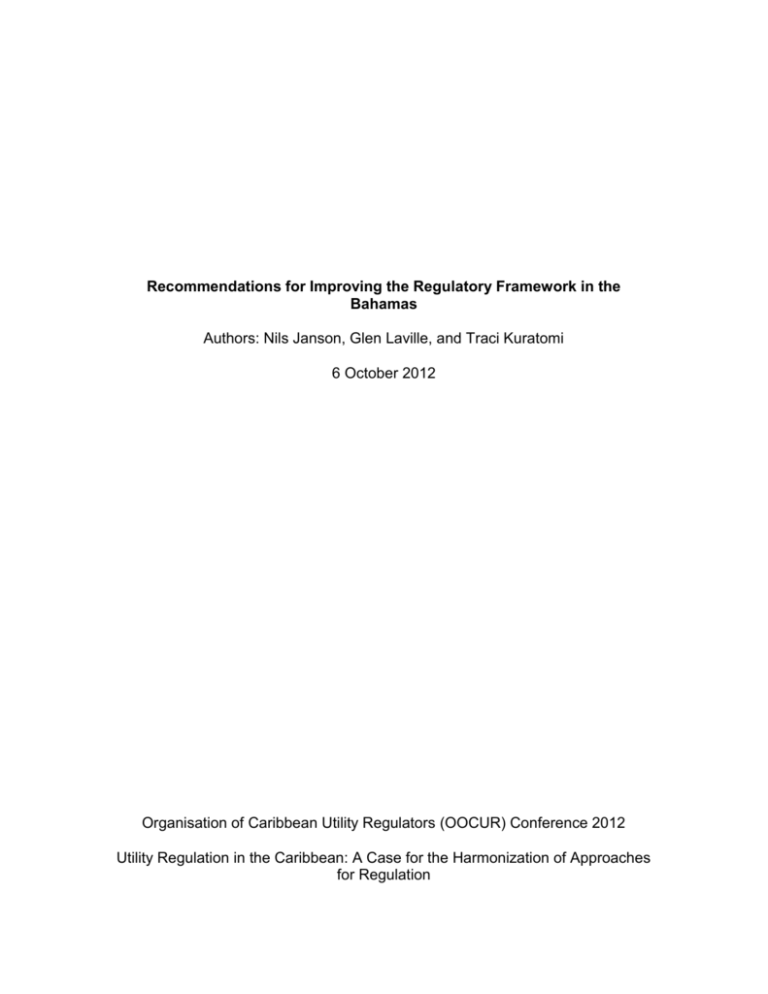
Recommendations for Improving the Regulatory Framework in the Bahamas Authors: Nils Janson, Glen Laville, and Traci Kuratomi 6 October 2012 Organisation of Caribbean Utility Regulators (OOCUR) Conference 2012 Utility Regulation in the Caribbean: A Case for the Harmonization of Approaches for Regulation Introduction The water and sanitation sector in The Bahamas is marked by inconsistent results, with some network providers performing well, some consumers receiving poor service, and the Water and Sewerage Corporation (WSC), the Governmentowned network utility, operating unsustainably. The ineffective regulation of the water and sanitation sector in the Bahamas has led to results, in particular for the WSC, that are not satisfactory to customers or to owners of the providers (for example, the Government in the case of the WSC). Poor results occur when the regulatory framework does not provide adequate incentives for proper performance or behavior. This uneven sector performance is closely related to an ineffective regulatory framework. This paper presents recommendations for improving the economic and environmental regulation of the water and sanitation sector. Economic Regulation of the Water and Sanitation Sector Challenges of the Economic Regulation of the Water and Sanitation Sector In a properly functioning market, service providers receive fair and reasonable returns in exchange for operating efficiently and providing customers with the service they desire at a price they can afford. Markets in sectors that are characterized by natural monopoly (a structural lack of competition) will only function properly if they are governed by effective economic regulation. Economic regulation is the set of rules and organizations that set, monitor, enforce, and change allowed tariffs and service standards.1 It seeks to address the problem of natural monopoly by mimicking competitive pressure. Therefore, poor outcomes in the water and sanitation market signal deficiencies in the regulatory framework. Interviews with the utilities, and secondary information provided by Government authorities reveals three key features of the economic regulation of the water and sanitation sector. First, all network providers lack a functioning regulator. The water and sanitation market in The Bahamas has no functioning regulator. The WSC is assigned several regulatory functions by the WSC Act, but does not perform these functions. In addition, it is inappropriate for the WSC to simultaneously operate as both a service provider and a regulator. 1 Groom, Halpern, and Ehrhardt, Explanatory Notes on Key Topics in the Regulation of Water and Sanitation Services, The World Bank Group, p. 1 2 Secondly, private network providers appear to perform well despite lacking a regulator. All three major private utilities charge tariffs that are sufficient to achieve financial sustainability, operate with a reasonable level of efficiency, and maintain an acceptable quality of service. The only major problem in the performance of the private network providers is that NPDC provides poor quality, highly saline water. Thirdly, the WSC is not operating on a sustainable basis. The WSC, the largest network utility in The Bahamas, faces well-documented problems of poor finances, deteriorating infrastructure, and low quality of service. The deterioration of WSC’s financial and operational performance has led to a reliance on government subsidies and a decrease in demand on New Providence. The deterioration can be attributed to four main reasons. First, the WSC’s cost of service has increased due to its greater reliance on desalination and due to increases in the costs of other inputs, such as electricity and fuel. Secondly, the WSC’s tariffs have fallen below the company’s cost of service. Thirdly, subsidies available to the WSC have had to be used to cover the increasing operating losses, which has led to reductions in capital expenditures in the system. Fourthly, decreased capital expenditures in the WSC’s system have contributed to a high and rising level of non-revenue water (NRW).2 The WSC’s problems are closely linked to an inadequate process for setting and reviewing tariffs, which keeps WSC’s rates well below the cost of service. The WSC has not been able to increase rates since 1999, and must receive approval from the Minister in order to do so. Recommendations for Establishing Effective Economic Regulation of Water and Sanitation in the Bahamas In order for economic regulation to be effective, it must account for the context in which it will be applied. Many past regulatory failures have stemmed from regulatory reforms that are not appropriate for the market and sector that is being regulated. There are six key factors that should be taken into consideration when developing economic regulation of the water and sanitation sector in The Bahamas. First, there is no competition among the network providers; each operates within a well-defined service area with limited overlap from other network providers. Secondly, private wells are a competing source of potable 2 Non-revenue water equals the volume of water put into supply minus the volume of water billed. 3 water. Thirdly, URCA is the most appropriate entity for economic regulation of water and sanitation, but does not currently have the authority, money, or capacity to do so. Fourthly, among the network providers, WSC clearly requires more substantial economic regulation, while the New Providence Development Company (NPDC), Grand Bahama Utility Company (GBUC), Paradise Utilities (PU), and other network providers could be regulated on a more limited basis. Fifthly, the jurisdiction for regulating GBUC is unclear (this is subject to the outcome of an ongoing court case between the Port Authority and the Office of the Attorney General). Sixthly, the priority for economic regulation in the sector is to put in place an appropriate tariff structure and appropriate service standards. The laws governing the sector must be changed to improve the economic regulation of the sector. Below, each of the recommendations is presented. Economic Recommendation 1: Empower Utilities Regulation & Competition Authority (URCA) as economic regulator URCA should be activated as economic regulator of the water and sanitation sector. It is understood that URCA was created with the intent that it would eventually become responsible for regulating the water and sewerage sector (in addition to its role as economic regulator of communications sector). URCA is well-placed to act as economic regulator of the water and sewerage sector for three reasons. First, it has the regulatory expertise to successfully regulate water and sanitation providers. URCA already regulates the communications sector, and URCA is familiar with the regulatory concepts and processes that will need to be applied to regulate the water and sanitation sector. Secondly, it has demonstrated that it has the independence necessary to regulate objectively. URCA has established and maintained its independence from both government and industry in order to operate and be seen as an objective regulator in the communications sector. Thirdly, the model of a single regulator operating in multiple sectors has strong precedent in the Caribbean. This model of a single regulatory authority with responsibility across multiple sectors works well in smaller countries that have few regulatory experts or a small number of regulated entities. 4 Economic Recommendation 2: Limit economic regulation in water and sanitation to network providers and regulate network providers through differentiated licenses It is recommended that URCA limit the economic regulation of the water and sanitation sector to network providers, and that URCA regulate network providers through differentiated licenses. In the water and sanitation sector, there are several entities that are commercial providers of potable water, including commercial self-suppliers, reverse osmosis producers, and water bottlers. However, network providers are the only entities that have natural monopolies and, thus, they are the only entities that should be subject to economic regulation. Of course, all providers, including the network providers, should be subject to environmental regulations and regulations related to health impacts. It is recommended that the network providers are regulated with licenses that have differentiated terms. This differentiated approach has been successfully implemented in the Caribbean and in states in the United States. It allows the economic regulator to focus its resources on the providers with the largest number of customers, providers with financial difficulties, and providers that are not providing an adequate quality of service. Differentiated licenses are also consistent with URCA’s light-handed regulatory philosophy. A light-handed approach to regulation costs consumers less than a uniform approach, requiring them to pay for only as much regulation as needed to ensure adequate performance and sustainability of each provider. Licenses should be differentiated based on the type of network providers. Three categories of licenses are recommended: individual licenses, class licenses, and registration licenses. Individual licenses will require the most oversight by URCA and registration licenses will require the least. Initially, WSC should be the only network provider subject to regulation through an individual license. Other water utilities and independent network providers should have class licenses, which will initially have no oversight of the tariffs and service standards. For class licenses, URCA’s oversight of tariffs and service standards would only be triggered if 30 percent of a utility’s customers petition for URCA review. Finally, condominium associations operating as network providers should be required to register with URCA under registration licenses, which require no active oversight by URCA. URCA will only review the performance of providers with registration licenses if a court determination requests URCA’s expert opinion, or if it receives a petition by 75 percent of the condominium association’s members. 5 All individual and class licenses issued by URCA should include the following key terms: service area exclusivity, service area obligations, minimum service requirements, length of licenses, and transition from franchise agreements or heads of agreement to licenses. It is further recommended that URCA begin regulating the water and sanitation sector by regulating the WSC with an individual license. URCA should regulate the WSC’s tariffs and service standards in a comprehensive rate review taking place at standard intervals (say every three to five years). This would require URCA to do three things. First, URCA must regulate the WSC’s tariff. The WSC’s tariffs must be set at a level that recovers its reasonable cost of service. 3 The WSC’s rates should gradually transition to a cost recovery level in a process managed by URCA, which would allow the WSC to improve its quality of service and justify the rate increases. During the transition, the Government should agree to pay a subsidy to the WSC that is equal to the difference between the WSC’s regulated rate and the cost recovery rate determined by URCA. Secondly, URCA must regulate the WSC’s service standards. Regulating service standards benefits both consumers and utilities, but URCA must carefully consider the cost-benefit trade-off that when deciding the level at which to set service standards. Thirdly, URCA should use output-based aid to provide targeted subsidies. The WSC’s geographical subsidies should be replaced with a targeted subsidy that provides tariff relief directly to low-income customers. This subsidy would cover the price of a clearly defined amount of water (for instance, the amount of the minimum consumption block) for targeted poor customers. Economic Recommendation 3: Fund URCA’s regulation of network providers in the water and sanitation sector with a fee paid by customers It is recommended that the Government use a levy in order to pay for the costs that URCA would incur while regulating the network providers in the water and sanitation sector. The amount of this levy would be based on the licensee’s annual revenues and would seek to cover a proportionate share of the relevant operating costs of URCA for regulating the licensee4. Each network provider 3 Groom, Halpern, and Ehrhardt, Explanatory Notes on Key Topics in the Regulation of Water and Sanitation Services, The World Bank Group, p. 47 4 These recommendations are consistent with provisions in Section 92 ‘URCA Fees’ of the Communications Act, 2009. Clause (1) (c) states “annual charges for licences to be calculated based on the licensee's relevant turnover” and (2) (d) indicates “shall seek to cover a proportionate share of the relevant operating costs of URCA under subsection (d) for the 6 would charge its customers this levy; that is, the costs of regulation would be passed-through from the network provider to its customers. This approach to paying for the costs of regulation is widely used by regulators since it increases the regulator’s autonomy. Furthermore, it is reasonable for customers to pay the costs of regulation since the regulated entity’s customers are the beneficiaries of the regulation. In addition, the Government should not charge any volumetric fees for abstraction of groundwater. In theory, charging households and businesses for abstracting groundwater might appear to be a reasonable approach for protecting the resource. However, in the case of the Bahamas, it is opined that implementing an abstraction fee is impractical and could lead to negative results. It is believed that the cost of identifying, metering, billing, and collecting volumetric fees from the users of groundwater would be restrictively high.5 In addition, an abstraction fee could lead to a higher rate of abstraction and greater use of what may be unsafe water by households. If the Government charges network providers an abstraction fee, then network providers would simply pass through the volumetric abstraction fee to their customers (the households and businesses). This would make it more attractive for households and businesses to increase the use of private wells and could lead to even an even higher rate of abstraction and greater use of what may be unsafe water. Environmental Regulation of Groundwater Protection and Pollution Control Challenges of the Environmental Regulation of Groundwater Protection and Pollution Control Fresh water in The Bahamas is extremely vulnerable to pollution because of the thin soils, the high porosity of the carbonate bedrock, and the fact that approximately 90 percent of the freshwater lenses are within five feet of the ground surface. However, The Bahamas does not have an effective framework for the management of water resources and the regulation of groundwater protection and pollution control. Responsibilities for managing the environmental threats described above are not well-defined and are spread across a number of Government agencies and corporations, including WSC, and various departments and sections within the performance of its duties under this Act. The fees for a licence shall be proportionate and be published in an appropriate and sufficiently detailed manner, so as to be readily accessible”. 5 It has been estimated that there may be as many as 40,000 private wells on New Providence alone. 7 Ministry of the Environment. In some cases, such as for the WSC, the responsibility for these regulatory functions is misplaced and should be transferred to another entity. In other cases, such as for Environmental Monitoring and Risk Assessment Division (EMRAD) and the Department of Environmental Health Services (DEHS), agencies have not been provided with the adequate human and financial resources to carry out their respective responsibilities. As a result, the Government does not have in place the capabilities required to effectively address the environmental threats to the groundwater supply (SENES 2005, WMC 2003, Hadwen and Cant 1980). There are four key threats that affect the groundwater supply. The first key threat, salt water intrusion, results from over pumping of aquifers is a chronic threat. Past studies have indicated that overexploitation is more likely to be a potentially critical problem on New Providence and Bimini (Cant 1980). The second key threat is improper disposal of sewerage and sanitation. The WMC study (2003) indicated that over 65 percent of the groundwater samples collected in the Bahamas showed signs of microbial contamination, most likely from septic and other sources of sanitary wastewater. This is evidence of a significant threat to aquifer water quality and, potentially, to human health. The third key threat is problems with wastewater disposal and discharge wells. In The Bahamas, the most common way to dispose of wastewater from wastewater treatment plants is to inject it into deep, saline aquifers below the shallow freshwater and brackish aquifers which are the source of potable water. Poorly installed, maintained, or operated deep disposal wells represent a significant, potential source of contamination to groundwater resources. The fourth key threat is problems resulting from excavations below water table. Excavations below the water table have the potential to cause the pollution of groundwater by causing sea water intrusion and exposing the aquifers directly to surface derived pollution. The most significant instance of below water table excavation occurred with the construction of the Grand Lucayan Waterway across Grand Bahama. This man made canal bifurcated one of the largest freshwater lenses in The Bahamas and caused partial sea water intrusion (WMC 2003). Additional, lesser threats to groundwater protection result from industrial and commercial activities, solid waste disposal, agriculture, and storm surge. 8 Recommendations for Environmental Protection and Pollution Control Regulation of Groundwater The current legal and regulatory framework allows for and perpetuates poor results in the water and sanitation sector. In order for environmental regulation to work properly, it must account for the context in which it will be applied. There are five key factors to consider for the environmental regulation of the water and sanitation sector in The Bahamas. First, fresh water resources in The Bahamas occur only as groundwater and the fresh groundwater floats as lenses on brackish groundwater, which increases in salinity with depth. Thus, freshwater lenses are extremely vulnerable to pollution. Secondly, reverse osmosis plants have become a key source of potable water. Only Andros, Abaco, and Grand Bahama have adequate water resources to meet current demands. Thirdly, there are a large number of private wells in The Bahamas, which has led to concerns about over abstraction and salt water intrusion. Fourthly, the provision of sewerage services is limited in The Bahamas. Over 50 percent of the wastewater produced on New Providence goes to individual septic systems; on the Family Islands septic systems are the predominant wastewater treatment practice for residences. Fifthly, industrial and commercial activities as well as agricultural activities are limited in The Bahamas. However, there have still been spills and problems resulting from improper disposal of wastes. The regulatory framework in place for protecting groundwater and controlling pollution must be significantly improved to address the serious environmental threats faced by The Bahamas. In order to improve the environmental regulation of groundwater protection and pollution control, it is recommended that the Government make three key changes to the environmental regulation of the sector. Each of these recommendations is described in further detail below. Environmental Recommendation 1: Create an Environmental Regulator and Groundwater Protection Unit The quality of the fresh groundwater resources of The Bahamas are under threat due to the lack of a comprehensive regulatory regime and resource management, and the lack of a monitoring and pollution prevention program. In order to develop and implement an effective program, it is recommended that an Environmental Regulator for Groundwater Protection Unit be created as a new section within the Environmental Monitoring and Risk Assessment Division (EMRAD) within the Department of Environmental Health Services. Creating the 9 Environmental Regulator as a new section in EMRAD is beneficial for several reasons. First, experience has shown that it is more effective and efficient to transform an existing entity than it is to create a new entity. Secondly, EMRAD’s functions are already closely aligned with the role and responsibilities recommended for the Environmental Regulator. Thirdly, two key agencies with which the Environmental Regulator must coordinate, the Bahamas Environment Science and Technology Commission (“the BEST Commission) and the Department of Physical Planning (“the DPP”), are located in the Ministry of Environment. The Unit should have two sub-sections: the Groundwater Resource Management subsection, which monitors and manages groundwater resources, and the Groundwater Quality and Pollution Control subsection, which reviews and approves applications for discharging groundwater. The other key responsibility of the Environmental Regulator is to provide support for all relevant Government entities with functions related to water management, including land use planning, building regulations, product controls, solid waste management, the prosecution of environmental offenses, environmental impact assessments, clean-up order, and environmental education and public awareness. In order to ensure the effectiveness of the Environmental Regulator, it is recommended that the Government should do three things. First, the Government should strengthen the regulatory enforcement of existing laws. There are existing laws and codes in place that could be used to enforce good management of and control certain threats to the groundwater resources. Secondly, the Government should expand and codify the draft Wastewater Policy prepared by the WSC, which would provide an excellent basis for a national sanitation policy. Thirdly, the Government should publicize major offences related to the environment in general and groundwater resources. Experience in many countries has shown that raising public awareness, and garnering grass roots public support and “policing” are key to building the political and corporate will to proactively protect and manage environmental resources (Cable and Benson, 1993) Environmental Recommendation 2: Institute the Phased Development of the Environmental Regulator The creation of the Environmental Regulator and the staffing process should be phased over a three-year period for budgetary and institutional development purposes. In its first two years, the Environmental Regulator should focus on New Providence, where the risks and challenges are greatest. Then, in the third year, the Environmental Regulator should expand its focus to Grand Bahama. In 10 ensuing years, the Environmental Regulatory should focus on the remaining Family Islands. Environmental Recommendation 3: License all non-residential entities Licensing of all non-residential entities that abstract groundwater, including commercial enterprises and utilities, is recommended. However, the Environmental Regulator should not license properties, such as gated communities, if they do not abstract a volume of water above a minimum threshold. The licensees should be charged an annual licensing fee to cover the Environmental Regulator’s costs of licensing and monitoring the groundwater. In addition, all non-residential entities that discharge wastewater into groundwater disposal wells should be licensed and charged an annual licensing fee for covering the Environmental Regulator’s costs of licensing and monitoring the groundwater disposal wells. Conclusion Establishing an effective regulatory framework for WSC will not be sufficient for transforming the utility into an efficient and financially sustainable water utility. Experience in other countries has shown that regulatory authorities face particular challenges when trying to regulate a company that is owned and controlled by the Government.6 This means that, in addition to improving the economic regulation of the WSC, the Government will have to consider actions, such as incorporating incentives that may only be binding through private investment in and management of WSC, to achieve its objectives. 6 Ehrhardt, D. and Janson, N., Can regulation improve the performance of government-controlled water utilities?, Water Policy, Vol 12 No S1 pp 23-40, 2010 11 Presenter’s Biography – Mr. Nils Janson Mr. Janson is an economist and financial specialist who advises governments, financial institutions, and private investors on strategies for developing, financing, governance, restructuring, and regulation of infrastructure. Mr. Janson has over 20 years of experience in the field, and over 10 years of internationally recognized experience in water sector reform, the regulation of the water sector, and tariff restructuring. Mr. Janson specializes in business valuation, financial analysis, due diligence, and pro forma financial modeling of companies and investment vehicles in the water and energy sectors. Mr. Janson’s experience also includes designing and implementing PPP transactions in the sector. Mr. Janson has worked in more than 30 countries in Latin America and the Caribbean, Africa, Eastern Europe, and the Middle East. In the Caribbean, Mr. Janson has worked with utilities in Antigua and Barbuda, The Bahamas, Barbados, Belize, Dominica, Grenada, Saint Lucia, St Kitts and Nevis, and St. Vincent and the Grenadines. 12 Contact Information for Authors Mr. Nils Janson Senior Vice President Castalia Strategic Advisors LLC. 1747 Pennsylvania Avenue, NW 12th Floor Washington, DC 20006 +1 (202) 466 - 6790 Nils.Janson@Castalia-Advisors.com Mr. Glen Laville General Manager Water and Sewerage Corporation Thompson Boulevard PO Box N-3905 Nassau, Bahamas wcglaville@wsc.com.bs Traci Kuratomi Senior Analyst Castalia Strategic Advisors LLC. 1747 Pennsylvania Avenue, NW 12th Floor Washington, DC 20006 +1 (202) 466 - 6790 Traci.Kuratomi@Castalia-Advisors.com 13
